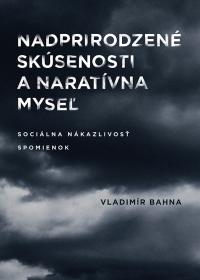Supernatural experiences and the narrative mind. Social contagion of memories

- Vladimír Bahna: Supernatural experiences and the narrative mind. Social contagion of memories. Bratislava: Institute of Ethnology and Social Anthropology SAS – VEDA SAS, 2019, 208 pp., ISBN 978-80-224-1775-4
The central research problem addressed by the author is the relationship between the idiosyncrasy of personal experiences and the collectives of culture. He follows an argument made by some folklorists that the relationship between personal experience narratives and culturally shared narratives is reciprocal. The shared knowledge about experiences of others, on the one hand, influences how people interpret their experiences and, on the other hand, shapes the form we give to our personal experience narratives when we tell them to others. Vladimír Bahna underpins this claim by current knowledge about the functioning of the human mind, and reminds that our lived experience with perception and memory is quite different from the way these systems actually work.
Human perception is not a one-way flow of sensory information to higher cognitive systems but a combination of information coming from sensors and predictions made by the brain which come from previous experiences but also learned knowledge. In specific situation of sensoric deprivation or high uncertainty, these predictions can completely substitute the insufficient sensoric input, and beliefs penetrate perception.
Similarly, human memory is not a vessel in which static information is deposited and later recalled; rather, it is a dynamic process of repeated construction of memories, which is subject to many internal and external influences. Ideas and concepts, widespread in society, dreams and beliefs, stories and experiences of others, can be and often are incorporated into autobiographical memories, which leads to so-called false memories.
In both cases, perception and memory, the impact of socially acquired knowledge increases in two conditions. First, situations of high emotional arousal increase the probability that perception or memory will be affected by learned information, and second, the incorporation of socially adopted knowledge depends on the social context in which this information is presented. Information from relatives and close friends, prestigious individuals, or information which is validated by collective consensus are more likely to be incorporated into one’s autobiographical memories or to be used to construct perception.
Vladimír Bahna supports these psychological findings by his own ethnographic field research from northern Slovakia, which was focused on a tradition of personal experience narratives about encounters with the supernatural. He shows that in the closest social environment of informants who claimed to have personal experiences with supernatural agents also circulated narratives about experiences of other people socially relevant to those informants and similar to their memories. These narratives can be interpreted as potential experience models that affected the formation of their memories. The ethnographic material presented in this monograph also reveals that successful cultural transitions of narratives about personal encounters with the supernatural rely heavily on the form of personal testimonies within close personal ties.
This book brings a new approach to oral traditions and to how religious and other supernatural beliefs transmit in society. Personal experiences are not as idiosyncratic as people usually assume. The recall of culturally significant events often occurs in the context of cues likely to support the creation of false memories. This fact opens up human autobiographies as a field for cultural transmission, of which personal experience narratives are one possible form and per-sonal experience narratives are one possible form of this.
Keywords:
superstitious storytelling; supernatural imaginings; memory; narrative mind